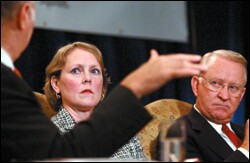Concerned about increasing competition in the global marketplace—particularly from China and India—leaders from business, education, government, and the nonprofit sector called last week for combining their K-12 education efforts to better prepare students for the workplace.

Participants at a conference organized by Jobs for the Future, a Boston-based nonprofit group, pointed to what they described as the United States’ poor showings on international tests in mathematics and science. They also cited data showing that only seven out of every 10 American 8th graders go on to earn high school diplomas, and that only three of those seven go on to get a college degree or other postsecondary credential.
Meanwhile, they noted, the number of American college students graduating with engineering degrees has remained stagnant, while the numbers for China, India, and other Asian countries have surged. (“U.S. Leaders Fret Over Students’ Math and Science Weaknesses,” Sept. 14, 2005.)
“This education-and-skills pipe-line is leaking badly,” said William H. Donaldson, a former chairman of the federal Securities and Exchange Commission, at the Sept. 20 conference here, titled “The Fate of the American Dream.”
Mr. Donaldson said current corporate and nonprofit efforts to bridge the education-workforce gap only pay “lip service” to the problem. He decried what he views as the piecemeal nature of business and nonprofit initiatives in K-12 education.
“How can we bridge the connectivity of all of these efforts?” Mr. Donaldson said. “This needs an entrepreneurial thrust.”
Ambition Found Lacking
He didn’t get much argument from government leaders and officials of the charitable arms of companies such as Citigroup Inc. and the Ford Motor Co. who took part in the conference.
Read the related story,
A prominent theme was how corporate foundations can leverage the time and money they give to precollegiate education so that high school students will have the math, science, problem-solving, and reasoning skills they need after they graduate—skills the conference-goers said public schools do not sufficiently teach.
U.S. Rep. Howard P. “Buck” McKeon, R-Ca., also decried what he called some American students’ lack of ambition, and the “hunger” that students from other countries have to succeed. Those factors, as well as lackluster math and science scores and subpar work skills among American students, endanger U.S. dominance in the global market, he argued.
“This is our Sputnik,” he said at the conference, referring to the Soviet satellite whose launch in 1957 was perceived as a wake-up call for improving U.S. math and science education.
Yet Daniel A. Domenech, who stepped down last year as the superintendent of the 165,000-student Fairfax County, Va., school district and was a panelist at the conference, defended the nation’s public education system.
Unlike other countries, he said, the United States educates all children. Still, he said, the nation needs to do a better job of educating children from low-income families and from lagging racial and ethnic minority groups.
“There seems to be a contradiction here,” said Mr. Domenech, now the senior vice president for urban markets for the McGraw-Hill Cos., a major publisher in New York City. “Are we not the number-one power in the world? Did this not happen with 85 percent of our population educated in the public schools?”
That may be, but corporations have long put money into K-12 programs aimed at molding a better-trained workforce, some of which were showcased at the conference.
The Bridge to Employment program run by New Brunswick, N.J.-based Johnson & Johnson trains low-income high school students for health-care careers, for example. The National Academy Foundation, set up by the New York City-based Citigroup Foundation, trains high school students for careers in financial services, technology, and tourism.
And the Ford Motor Company Fund’s Partnership for Advanced Studies works with colleges and businesses to draw high school students into business, engineering, and technology careers.
Yet such efforts often are isolated and unconnected, said some at the conference. Hilary C. Pennington, the vice chairman and co-founder of Jobs for the Future, which specializes in education and workforce issues, called the business-backed projects commendable but “siloed.”
The conference was a first step for many companies in figuring out how to work together, said Mike Schmidt, the director of education and community development for the Ford Motor Company Fund, the charitable arm of the Detroit-based carmaker and a major sponsor of the conference. A second conference underwritten by the fund will be held early next year to further the conversation, he added.
But corporate donors must do more than team up if they hope to affect public education on a broad scale, cautioned Frederick M. Hess, the director of education policy studies at the American Enterprise Institute, a Washington think tank. Mr. Hess, the editor of a forthcoming book on education philanthropy, argued that funders have traditionally favored “safe” programs—many of which have yielded little academic improvement.
“What we need is for philanthropy to [fund] significant innovation and … not to skirt away from controversy,” he said.
Patty Stonesifer, the president of the Seattle-based Bill & Melinda Gates Foundation, stressed that companies can help spur change by combining their business acumen with charitable giving and by forging strong partnerships between the government, education, business, and nonprofit sectors.
“If you want to go fast, go alone,” said Ms. Stonesifer, citing an African proverb. “If you want to go far, go together.”




